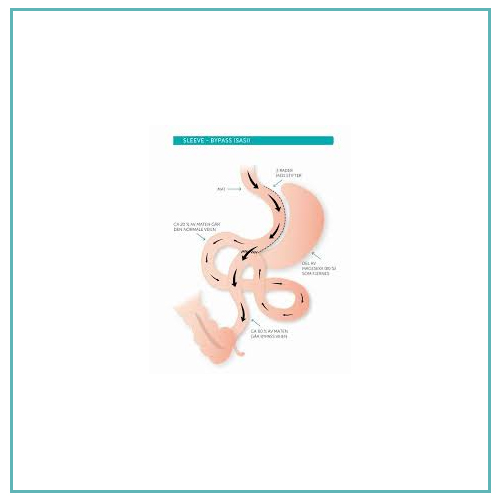Know the facts about bariatric surgery
Who is a typical bariatric surgery patient
How does bariatric surgery work
Bariatric weight loss surgery…
is a treatment which minimises the amount of food you can eat by reducing the size of your stomach. There are a range of weight loss treatments available which have been designed to help you lose weight, reduce your portion sizes and lead a healthier lifestyle.
Each weight loss surgery has their own advantages and disadvantages, with some being less invasive than others. At New Leaf our expert bariatric surgeons will work with you to identify the most effective treatment, helping you to get the most out of your weight loss goals.
Common weight loss procedures include the revolutionary SASI bypass, RNY gastric bypass, Mini gastric bypass and sleeve gastrectomy. Below you will find explanations of the different types of surgery to help you decide.
Gastric Sleeve
%
EWL
This procedure is now the number one Bariatric procedure in the world. Other names for this operation are vertical sleeve gastrectomy (VSG) or gastric sleeve resection of the stomach. It originated as part of another surgical procedure, called a biliopancreatic diversion with duodenal switch, where the sleeve resection was performed first as part of this procedure. Gradually it became clear that, for a number of clients, this first procedure was in itself sufficient, and so this procedure has been launched independently. This procedure was finally adopted in 2008 and has been recognized as a fully-fledged operation.
✓ Criteria BMI 35 or above or 30 with Diabetes Type 2 or other co-morbidities
✓ Approximately 80% of the stomach is removed, so you can’t eat as much as you could before.
✓ You feel satisfied with much smaller portions.
✓ The other important effect is that the levels of an appetite stimulating hormone (ghrelin) are reduced. Less ghrelin means lesshunger which in turn means you eat less.
✓ Some patients find the “not feeling hungry” overwhelming and eat very little post surgery.
✓ You can develop nutrient deficiencies, so you are advised to undertake a high protein diet and vitamin and mineral supplementation.
✓ This is a completely non reversible procedure.
Sasi Bypass

%
EWL
A Promising new operation for obese and diabetic patients. SASI (single anastomosis sleeve ileal bypass) is a mixture between gastric sleeve and gastric bypass surgeries.
Gastric Bypass RNY
%
EWL
✓ Criteria:BMI 35 or above.
✓ This surgery is regarded as the Gold Standard.
✓ The top part of the stomach is sectioned off to make a small stomach pouch the size of a large egg so you can’t eat as much as you used to.
✓ The small intestine is rearranged to connect to both (see image above).
✓ The surgery works by restriction and changes in gut hormones.
✓ Most patients with Type 2 Diabetes can expect to see remarkable improvement in blood sugar control, often without the need for any regular diabetic medications.
✓ If you eat sweet food you may develop dumping syndrome, where your blood sugars fall rapidly, and you feel hot, light headed, heart may palpate or feel faint.
✓ You can develop nutrient deficiencies so a high protein diet and vitamin and mineral supplementation is essential.
✓ This is both a restrictive and a malabsorptive procedure which produces the greatest metabolic effects but also has the potential of having more long term complications in the form of nutritional deficiencies.
The malabsorption component of this operation can increase the efficiency of the op when compared with purely restrictive operations (although recent studies show that there is a similar effect with the sleeve gastrectomy), but brings side effects in the form of deficiency of certain micronutrients such as iron, vitamin B12, vitamin D and others. In the postoperative period is therefore necessary to constantly monitor these nutrients and substitute with vitamin tablets (get your GP to give you regular blood tests).
%
EWL
✓ Criteria: BMI 35 or above.
✓ Similar to the gastric bypass however the small bowel is directly joined to the small stomach pouch (see images above) hence only one join.
✓ Only a single incision is required compared to 2 incisions with the gastric bypass.
✓ The procedure takes a little less time than the RNY gastric bypass.
✓ Instead of a small pouch like with the gastric bypass, the mini gastric bypass surgery procedure creates a narrow tube-like pouch that holds approximately 1-2 ounces, restricting the amount of food that can be taken in at one time.
✓ As some of the small bowel is bypassed you also have changes in gut hormones and feel less hunger.
✓ One of the disadvantages of this surgery compared to the gastric bypass includes a greater likelihood of experiencing bile reflux.
if you have reflux the gastric bypass is a much better option.
✓ As with the gastric bypass you can develop nutrient deficiencies so a high protein diet and vitamin and mineral supplementation is essential.
✓ You may develop dumping syndrome similar to the gastric bypass.
✓ Expected excess weight loss approximately 85%.
✓ Many patients experience changes in taste and food preferences
✓ Because you will eat less and absorb fewer calories, you will lose weight. Following surgery, and for the remainder of your life, it is important to take a bariatric multivitamin, calcium, vitamin B12, and iron (for women of menstruating age).
FAQ's
What is the best surgery for you?
Criteria
Possible complications
